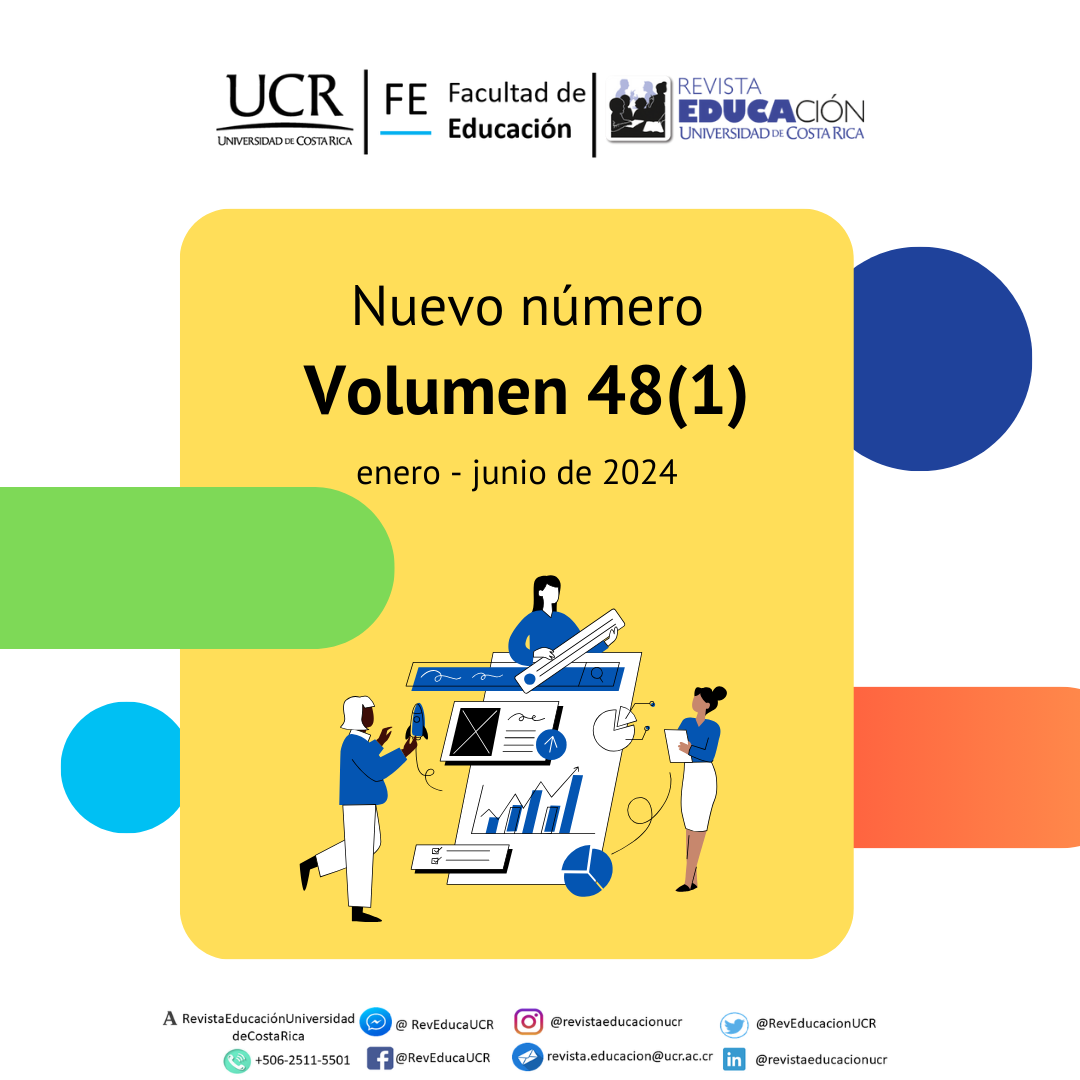Abstract
Although the children's perspective can contribute to enrich the teaching of the contents present in the Chilean history curriculum and in the school texts of this subject, it is essential to be cautious about the following three didactic and epistemic aspects in its implementation in order to develop historical thinking in students: 1) the risk of generalizing childhood as an abstract category; 2) the possible danger of promoting social stereotypes against the adult world; and 3) the scarce development of historical knowledge about childhood. As a result of these problems, this essay presents a hermeneutic analysis that aims to substantiate these risks to establish consistent didactic and epistemological guidelines when integrating the perspective of children in the history classroom. Methodologically, this work is backed by a scoping review of normative documents of the Chilean History, Geography, and Social Sciences curriculum and publications hosted in different databases (Latindex, Wos, Scopus, Scielo, Clacso, Redalyc, ProQuest, and Dialnet). Moreover, the author conducted this paper under the inductive method, the humanistic paradigm, with a qualitative approach, interpretative type, and topical narrative design. Therefore, as a conclusion, it is necessary to advance towards a critical curriculum that considers the teaching of childhood in history; however, to do so, society needs to overcome several obstacles associated with the predominance of technical curricular rationality and the current educational policy in Chile.
References
Acosta, W. (2012). La infancia como sujeto de derechos según UNICEF. Aportes para una lectura crítica y de extrañamiento. Pedagogía y Saberes, (37), 89-101. https://doi.org/10.17227/01212494.37pys89.101
Álvarez, H. (2021). What do history manuals say about childhood? Analysis of chilean school textbooks [¿Qué dicen los manuales de historia sobre la infancia? Análisis de los textos escolares chilenos]. Childhood & Philosophy, (17), 1-32. http://educa.fcc.org.br/pdf/childphilo/v17/1984-5987-childphilo-17-e62884.pdf
Álvarez, H. (2022). Los libros de texto y sus discursos: Representaciones de las mujeres en la historia escolar chilena (13.000 a. C. - 1810). História da Historiografia, 15(38), 97-136. https://doi.org/10.15848/hh.v15i38.1817
Álvarez, H. (2023). El laboratorio histórico como estrategia de indagación para desarrollar el pensamiento histórico en la formación del profesorado de Historia. Interciencia, 48(5), 245-251. https://dialnet.unirioja.es/servlet/articulo?codigo=8985985
Appleby, J., Hunt, L. y Jacob, M. (1994). La verdad sobre la historia. Andrés Bello.
Ariés, P. (1978). El niño y la historia familiar en el Antiguo Régimen. Taurus.
Bases Curriculares de 1º a 6º básico. (2018). Documento curricular. Ministerio de Educación de Chile.
Bases Curriculares de 7º básico a 2º medio. (2016). Documento curricular. Ministerio de Educación de Chile.
Beltrán, G., Fuentes, F., Panza, P. y Valdés, C. (2019). Texto escolar de Historia, Geografía y Ciencias Sociales 7° básico. Editorial SM.
Bjerke, H. (2011). Children as ‘differently equal’ responsible beings: Norwegian children’s views of responsibility [Los niños como seres responsables “diferentemente iguales”: La visión de los niños noruegos sobre la responsabilidad]. Childhood, 18(1), 67-80. https://doi.org/10.1177/0907568210371987
Britton, J. (2014). Young people as moral beings: Childhood, morality and inter-generational relationships [Los jóvenes como seres morales: Infancia, moralidad y relaciones intergeneracionales]. Children & Society, 29(5), 495-507. https://doi.org/10.1111/chso.12085
Chávez, P. y Vergara, A. (2017). Ser niño y niña en el Chile de hoy. La perspectiva de sus protagonistas acerca de la infancia, la adultez y las relaciones entre padres e hijos. Ceibo.
Cockburn, T. (2005). Children and the feminist ethic of care [Los niños y la ética feminista del cuidado]. Childhood, 12(1), 71-89. https://doi.org/10.1177/0907568205049893
Cockburn, T. (2013). Rethinking children’s citizenship [Repensar la ciudadanía de los niños]. Palgrave McMillan.
Cuesta, R. (2022). Creaciones prodigiosas: Disciplinas escolares e historia del currículum. Historia de la Educación, 40(1), 61-79. https://doi.org/10.14201/hedu2021406179
Demause, Ll. (1974). Historia de la infancia. Alianza Editorial.
Figueroa, C. (2016). ¿Ciudadanía de la niñez? Hallazgos de investigación sobre el movimiento por una cultura de derechos de la niñez y adolescencia en Chile. Última Década, 24(45), 118-139. https://www.scielo.cl/scielo.php?script=sci_arttext&pid=S0718-22362016000200007&lng=en&nrm=iso&tlng=en
Hobsbawm, E. (2013). Gente poco corriente: Resistencia, rebelión y jazz. Crítica.
Honeyman, S., Silva, C., Quintana, S. y Santelices, C. (2017). Texto escolar de Historia, Geografía y Ciencias Sociales 2° medio. Santillana.
Jodelet, D. y Balduzzi, M. (2011). Aportes del enfoque de las representaciones sociales al campo de la educación. Espacios en Blanco. Revista de Educación, 21(1), 133-154. https://www.redalyc.org/pdf/3845/384539803006.pdf
Marolla, J. y Saavedra, C. (2020). Presencia y ausencia de América Latina. La didáctica de las ciencias sociales y la interculturalidad como desafío para la enseñanza. Revista Interdisciplinaria de Estudios Latinoamericanos, 4(1), 75-92. https://zenodo.org/record/3628857
Mayall, B. (2003). Towards a sociology for childhood [Hacia una sociología de la infancia]. Open University Press.
Pagès, J. y Villalón, G. (2013). Los niños y las niñas en la historia y en los textos históricos escolares. Analecta Calasanctiana, (109), 29-66.
Pagès, J. (2018). Aprender a enseñar historia. Las relaciones entre la historia y la historia escolar. Trayectorias Universitarias, 4(7), 53-59. https://revistas.unlp.edu.ar/TrayectoriasUniversitarias/article/view/6369
Pollock, L. (1990). Los niños olvidados. Relaciones entre padres e hijos de 1500 a 1900. Fondo de Cultura Económica.
Quintana, L. y Hermida, J. (2019). La hermenéutica como método de interpretación de textos en la investigación psicoanalítica. Perspectivas en Psicología: Revista de Psicología y Ciencias Afines, 16(2), 73-80. https://www.redalyc.org/journal/4835/483568603007/html/#:~:text=En%20la%20investigaci%C3%B3n%20hermen%C3%A9utica%2C%20el,sus%20preguntas%20e%20interpreta%20el
Rojas, J. (2016). Historia de la infancia en el Chile Republicano, 1810-2010. Ediciones de la Junji.
Sosenski, S. y Jackson, E. (2013). Nuevas miradas a la historia de la infancia en América Latina: Entre prácticas y representaciones. Instituto de Investigaciones Históricas de la Universidad Nacional Autónoma de México.
Sosenski, S. (2015). Enseñar historia de la infancia a los niños y las niñas: ¿Para qué?. Revista Tempo e Argumento, 7(14), 132-154. https://doi.org/10.5965/2175180307142015132
Stone, L. (1990). Familia, sexo y matrimonio en Inglaterra, 1500-1800. Fondo de Cultura Económica.
Vergara, A. (2014). Public policy discourses on childhood during Chilean postauthoritarian democracy: A case of discursive colonization by the language of the free market [Discursos de política pública sobre la infancia durante la democracia posautoritaria chilena: Un caso de colonización discursiva por el lenguaje del libre mercado]. Childhood, 22(4), 432-446. https://doi.org/10.1177/0907568214549079
##plugins.facebook.comentarios##

This work is licensed under a Creative Commons Attribution-NonCommercial-NoDerivatives 3.0 Unported License.
Copyright (c) 2023 Revista Educación - Journal of Education







